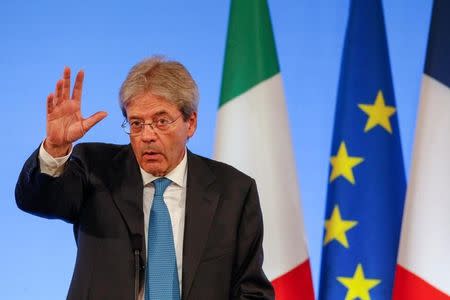Italy calls confidence votes in Senate on new electoral law

By Steve Scherer
ROME (Reuters) - Italian Prime Minister Paolo Gentiloni's government on Tuesday called a series of confidence votes to pass a new electoral law as the anti-establishment 5-Star Movement, which is likely to be hurt by the new legislation, pledged to protest on the streets.
The government is resorting to the confidence votes to avoid secret voting in the Senate, where it has a narrow majority and at least four members of the ruling Democratic Party have said they will not cast a ballot.
The confidence votes will be held by open ballot starting on Wednesday afternoon, with the final confidence vote to be held on Thursday. The government is forced to resign if it loses such a vote.
A centrist group that is not formally part of the government's majority has said it will provide up to 10 votes to help pass the law if needed.
The bill, dubbed the Rosatellum, is supported by the Democratic Party (PD) and mainstream centre-right opposition parties. It favours parties which group together ahead of the election.
It is likely to hurt 5-Star, which refuses to join any alliance, and left-wing parties that do not want to join a coalition with the PD.
The 5-Star Movement, which tops many opinion polls, has called a street protest in front of the Senate for Wednesday afternoon, against what it sees as an attempt by its mainstream rivals to scupper its chances at the election.
It will be joined by the leftist Democratic and Progressive Movement (MDP), which split from the PD this year, and other small left-wing groups.
Apart from the PD, the legislation is supported by Silvio Berlusconi's centre-right Forza Italia (Go Italy!) and the right-wing Northern League.
The Rosatellum is the best compromise possible among political adversaries, according to the PD parliamentary party leader, Ettore Rosato, after whom the reform has been named.
In two separate rulings, the Constitutional Court struck down previous laws, leaving the upper and lower houses with different rules.
President Sergio Mattarella has called on parliament to come up with a mew electoral law that applies equally to both houses before a national vote, due by May of next year.
All previous attempts to harmonise the rules have failed, most recently in June when dissident deputies used a secret vote to up-end part of the proposed legislation.
While the current law would harmonise rules for both houses, polls suggest it will not hand any coalition or party a clear mandate to govern.
The proposed election law would distribute almost two-thirds of the seats in parliament on a proportional basis, while a third would be decided in a first-past-the-post vote on specific candidates.
Coalitions would need to get 10 percent of the national vote to get into parliament, while parties running alone would need only 3 percent. Candidates would be chosen by party chiefs.
(Additional reporting by Giuseppe Fonte; Editing by Richard Balmforth)

